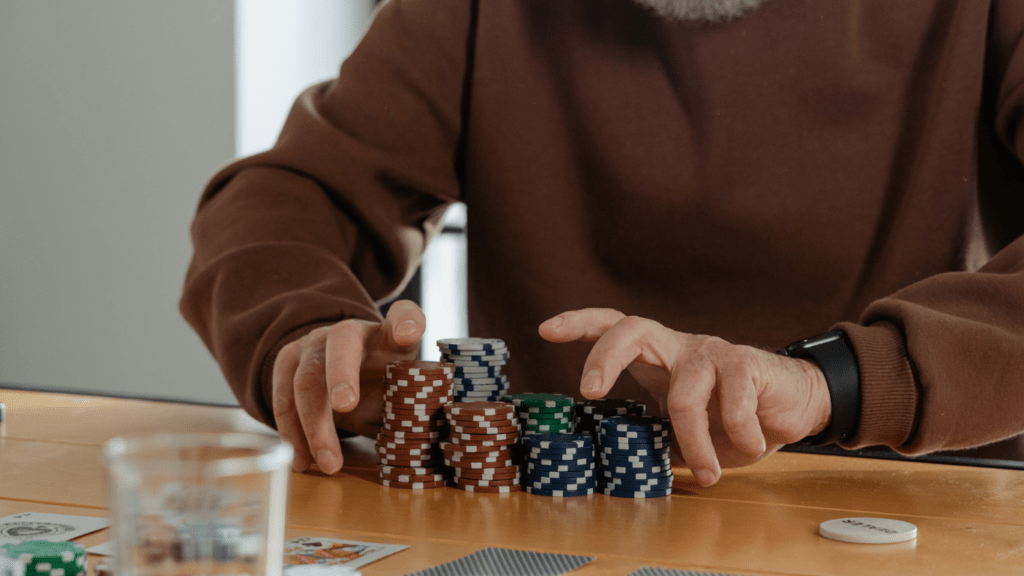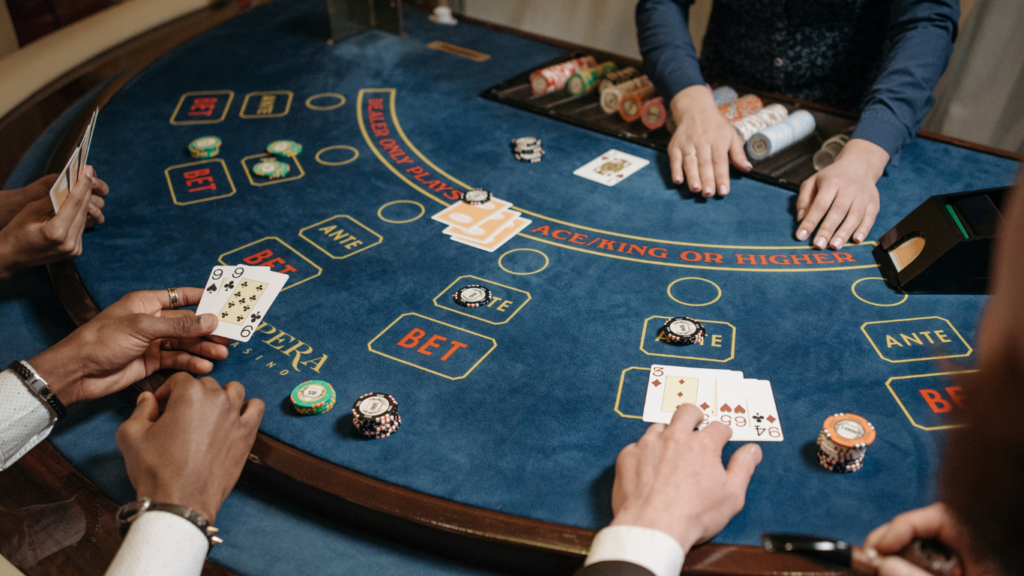Understanding Gambling Addiction
Gambling addiction, also known as compulsive gambling, represents a profound issue impacting individuals on multiple levels. The compulsive need to bet, often beyond one’s means, drives this behavior. Unlike casual gamblers, those with an addiction find it challenging to stop despite negative consequences. This loss of control distinguishes addiction from occasional gambling.
A key factor in gambling addiction involves the brain’s reward system. Engaging in betting stimulates the release of:
- dopamine
- creating feelings of pleasure
- excitement
Over time, this reaction can lead to dependency as the brain craves the dopamine surge, similar to substance abuse. Recognizing these patterns is critical in identifying gambling addiction.
Psychologically, gambling addiction manifests as an inability to resist the impulse to gamble despite harmful outcomes. It’s common for individuals to chase losses, believing that a big win can solve their problems. This behavior often results in a cycle of increasing losses and heightened desperation to recover them.
Emotionally, those affected may experience anxiety, depression, and stress. These feelings often exacerbate the addiction as individuals use gambling to escape unpleasant emotions. Family relationships and social connections can become strained under these pressures, leading to isolation.
Awareness of these signs and understanding the underlying mechanisms help in identifying and addressing gambling addiction. Recognizing the condition starts the journey to recovery, allowing individuals to rebuild healthier life dynamics and regain control.
The Appeal of Jackpot Betting

Jackpot betting combines the hope of a life-changing win with the enjoyable anticipation of the draw. Understanding its appeal is key to recognizing why it can become addictive.
The Thrill Factor
The excitement of jackpot betting often attracts individuals seeking adrenaline. Each ticket purchased offers the possibility of an extraordinary win, creating a sense of exhilaration that’s hard to match. Anticipation builds with each draw, leading to intense emotional highs and lows that captivate participants. This rollercoaster experience can, however, blur the line between entertainment and addiction.
The Illusion of Control
- Many people engaging in jackpot betting believe they possess the ability to influence outcomes.
- This illusion is fueled by strategies like choosing specific numbers and rituals thought to increase chances of winning.
- While these practices offer a sense of empowerment, they mask the random nature of results, encouraging continued betting.
- This perceived control can lead individuals to overlook risks as they focus on the prospect of achieving success on their terms.
Recognizing Signs of Addiction
Understanding gambling addiction necessitates recognizing behavioral, financial, and emotional signs in individuals involved in jackpot betting. Identifying these signs early empowers individuals to seek help and mitigate potential consequences.
Behavioral Changes
Behavioral changes provide crucial insight into gambling addiction. Individuals may exhibit secrecy by hiding betting activities or lying about the time spent gambling. Increased preoccupation with gambling often manifests as obsessively planning the next bet or reliving past experiences. Irritability and restlessness appear when attempting to reduce or stop gambling.
Financial Strain
Financial strain is a tangible sign of gambling addiction. Continuous borrowing, maxed-out credit cards, or depleted savings highlight the financial consequences of compulsive gambling. Individuals may neglect essential financial obligations like bills or debts, prioritizing gambling expenses over necessities.
Emotional Indicators
Emotional indicators offer significant clues to gambling addiction. Anxiety and depression commonly arise as individuals grapple with the repercussions of their gambling habits. Mood swings and frustration often occur when facing losses or the inability to gamble. This emotional turmoil can strain personal relationships, creating an isolated emotional state.
The Impact on Lifestyle
Gambling addiction in jackpot betting can significantly alter one’s lifestyle, affecting relationships, social life, and personal health. Recognizing these changes is crucial in addressing the broader consequences of addiction.
Relationships and Social Life
Frequent gambling can strain personal relationships. Friends and family might notice increased secrecy or withdrawn behavior. I’ve observed that social interactions suffer as a gambler’s focus shifts to betting activities. This preoccupation can lead to neglect of social responsibilities, creating tension and alienation from loved ones. An individual may begin to isolate themselves, preferring to stay connected with gambling communities rather than participating in their usual social circles.
Mental and Physical Health
Gambling addiction often impacts both mental and physical health. Anxiety and depression become prevalent as financial stress and guilt from betting losses accumulate. I’ve learned that physically, stress-related ailments like headaches and disrupted sleep patterns can manifest. The pressure to recover losses can exacerbate these conditions, creating a detrimental cycle that affects overall well-being. Recognizing these symptoms is essential, as they significantly impact day-to-day life and create additional barriers to tackling addiction.
Strategies for Prevention
Preventing gambling addiction requires proactive measures to create healthy betting habits and mitigate risks. Using specific strategies, like setting strict limits and seeking support, can effectively reduce the chances of developing compulsive gambling behaviors.
Setting Limits
Establishing boundaries on time and money spent on betting activities forms a crucial preventative measure. I advocate for creating a strict budget to control gambling expenditures and avoid using credit or borrowing. Allocating a specific time frame for gambling activities helps maintain balance, ensuring it doesn’t interfere with work or relationships. Continually reassessing these limits ensures they remain effective and relevant.
Seeking Support
Accessing support networks can be invaluable for maintaining control over gambling habits. I recommend seeking guidance from friends, family, or professional counselors who understand the complexities of gambling addiction. Joining support groups can offer shared experiences and coping strategies. Encouragement and accountability from others strengthen the resolve to stick to healthy gambling practices and prevent escalation.



 Mitchellin Campersonics
Crypto Jackpot Analyst
Mitchellin Campersonics serves as the Crypto Jackpot Analyst at Jackpot Lucky Deal, specializing in the intersection of cryptocurrency and online jackpots. With a background in digital currencies and extensive experience analyzing the crypto market, Mitchellin provides unique insights into the emerging world of crypto-based jackpots. Her role involves exploring innovative betting strategies, evaluating crypto jackpot trends, and helping players understand the benefits and risks of this cutting-edge betting space. Known for her analytical mind and clear communication, Mitchellin’s articles and reports give Jackpot Lucky Deal readers a competitive edge in the world of crypto jackpots, arming them with knowledge to make informed decisions in a rapidly evolving market. Mitchellin is passionate about helping players navigate this new territory, ensuring they have access to both practical advice and up-to-date information.
Mitchellin Campersonics
Crypto Jackpot Analyst
Mitchellin Campersonics serves as the Crypto Jackpot Analyst at Jackpot Lucky Deal, specializing in the intersection of cryptocurrency and online jackpots. With a background in digital currencies and extensive experience analyzing the crypto market, Mitchellin provides unique insights into the emerging world of crypto-based jackpots. Her role involves exploring innovative betting strategies, evaluating crypto jackpot trends, and helping players understand the benefits and risks of this cutting-edge betting space. Known for her analytical mind and clear communication, Mitchellin’s articles and reports give Jackpot Lucky Deal readers a competitive edge in the world of crypto jackpots, arming them with knowledge to make informed decisions in a rapidly evolving market. Mitchellin is passionate about helping players navigate this new territory, ensuring they have access to both practical advice and up-to-date information.

